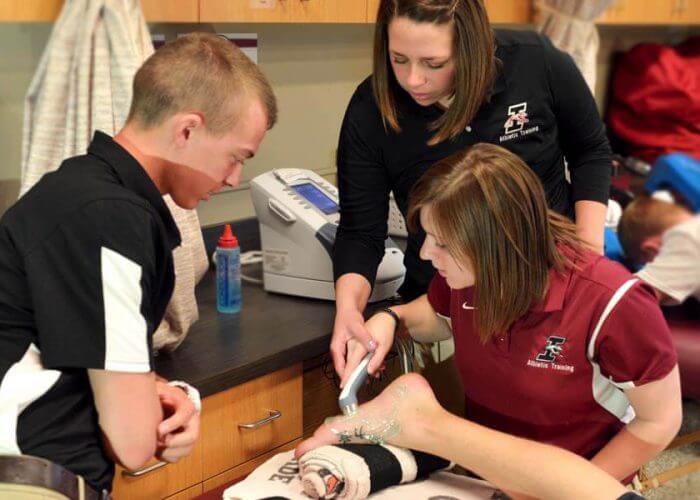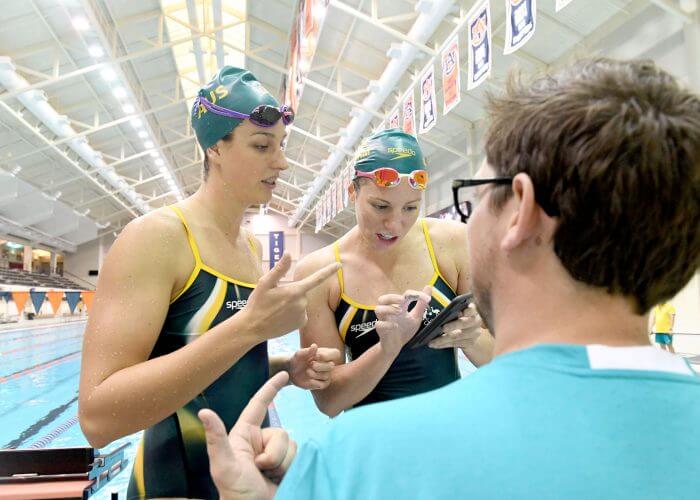Four Ways to Become a Student of the Sport

By Taylor Covington, Swimming World College Intern.
There’s no such thing as a mindless sport, not even if yours evokes some pre-programmed robot persona that wakes in the wee hours, tugs on the same suit, warms up in the same lane, and stares at the same tiled line for laps on end. Not even then.
Swimmers would be remiss in thinking that success in the sport relies solely on physical preparation. Sure, some weeks are intended to blend together into a watery mass of grueling routine, but most elite swimmers realize that this is only part of the process. They evade the monotony and supplement their training regimens by attacking the sport from every angle. Most swimmers, however, overlook the research and study aspects of their sport. The more informed and “swim-ducated” the swimmer, the more they will understand the training and importance of specific workouts. Think of it as earning a baccalaureate in body position – a Ph.D. in the pullout, if you will.
Here are four ways to elevate your training by becoming a student of the sport:
1. Recognize and utilize your resources.

Photo Courtesy: University of Indianapolis
Make it easier on yourself. Most college staff are equipped with experts in areas ranging from nutrition, conditioning, training, and sports psychology. Use them. It’s true that most swimmers don’t even know about the plethora of resources at their disposal. And if you’re not a collegiate athlete with an army of athletic resources? Find the experts hidden in your daily life.
Maybe you’re working on that coveted ankle flexibility to get the most out of your flutter kick. It’s possible your high school track coach has researched this thoroughly to supplement his sprinters’ training. Or maybe you want to take your nutrition more seriously. Every school has that overly passionate biology teacher who launched last year’s cafeteria healthy-eating campaign. Most teachers and coaches, even those in other areas of expertise, are willing and eager to share what they know. Benefit from this. Don’t dismiss people because they aren’t directly involved in your sport. Swimming success isn’t just based off of what you do in the pool, so find the experts in every field to develop your full athletic experience.
2. Do your homework.

Photo Courtesy: Pixabay
Fire those mirror neurons. Watch swimmers of higher skill levels, and pay attention to other races at meets – even if they’re not events you normally swim. All races share many of the same components. You’d be surprised at the interesting details you can pick up from a start, turn, or even a pre-race routine.
Many swimmers also benefit from film study. Keep it simple, and find one technical aspect of your race that needs some cleaning up. Then, see what the elites are doing. You can supplement with research articles and drills, but nothing quite beats the effectiveness of a multi-angle YouTube video. Most importantly, tailor it to yourself. If you’re a mid-distance, DPS-style breaststroker, don’t spend your research time poring over Adam Peaty’s fast turnover rate. Find similar, better swimmers, and identify where your races could be lacking. Better yet, ask a teammate or coach to film you during practice. Then, set up your own mini-analysis and hone in on the fine details in comparing the two. Bring it to practice the next day.
3. Engage your mind during practice.

Photo Courtesy: MaxPixel
It’s true that there’s something very special in the mind-body connection during exercise. This is where you can begin to put your research into practice, so enter each session with a specific goal. That may be streamlining ten yards off each wall or remembering to kick from the hips in your backstroke, but keep it at the forefront of your focus during your workout. This is the time to strengthen your skills while also breaking up the monotony of longer, aerobic days. Engage your brain, and your body will begin to listen. Be a practicing student of the sport.
4. Engage with your fellow student swim-tellectuals.

Photo Courtesy: Delly Carr / Swimming Australia Ltd.
This includes your coach. Interact with others in the swim community, and advocate for yourself. If something feels off, articulate this in a conversation with your coach. Oftentimes coaches have a difficult time picking out the fine details in white-water practices with fifty bodies moving back and forth. Being communicative can make your coach’s job easier, with more focused parameters and specific technique questions. Don’t be afraid to analyze previous races with your coaches or teammates. Bounce ideas off one another, crunch splits and goal times, and talk about previous experiences that succeeded and failed. You might just benefit when your teammate responds with “You know, a swimmer on my club team had the exact same problem and…” You also never know when your experiences can benefit someone else in the broader thinking swim community!
All commentaries are the opinion of the author and do not necessarily reflect the views of Swimming World Magazine nor its staff.




My swimmers and families will read this article. Coaches are under a heavy burden,coaching the next greats in their programs. Families need to understand the swimmer also carries some responsibilities in the process. On target. Swimmers take notice.
Swimming is so misunderstood , in regards what it takes to be successful. The key to longevity and avoiding burn out, is road mapped in this article. Keeping the mind fresh as much as the body , is a neglected part of many club programs. As stated, many working parts have to come together, for a swimmer to become productive.